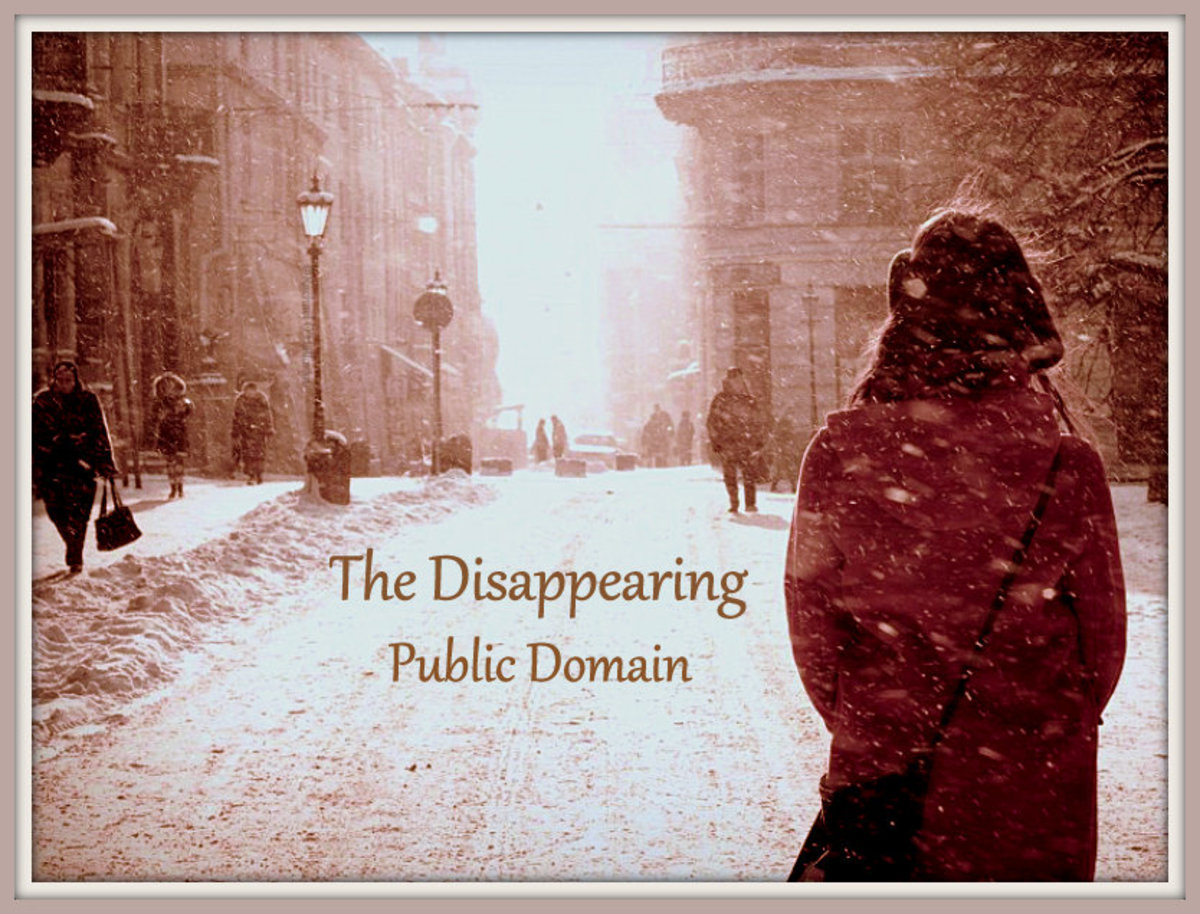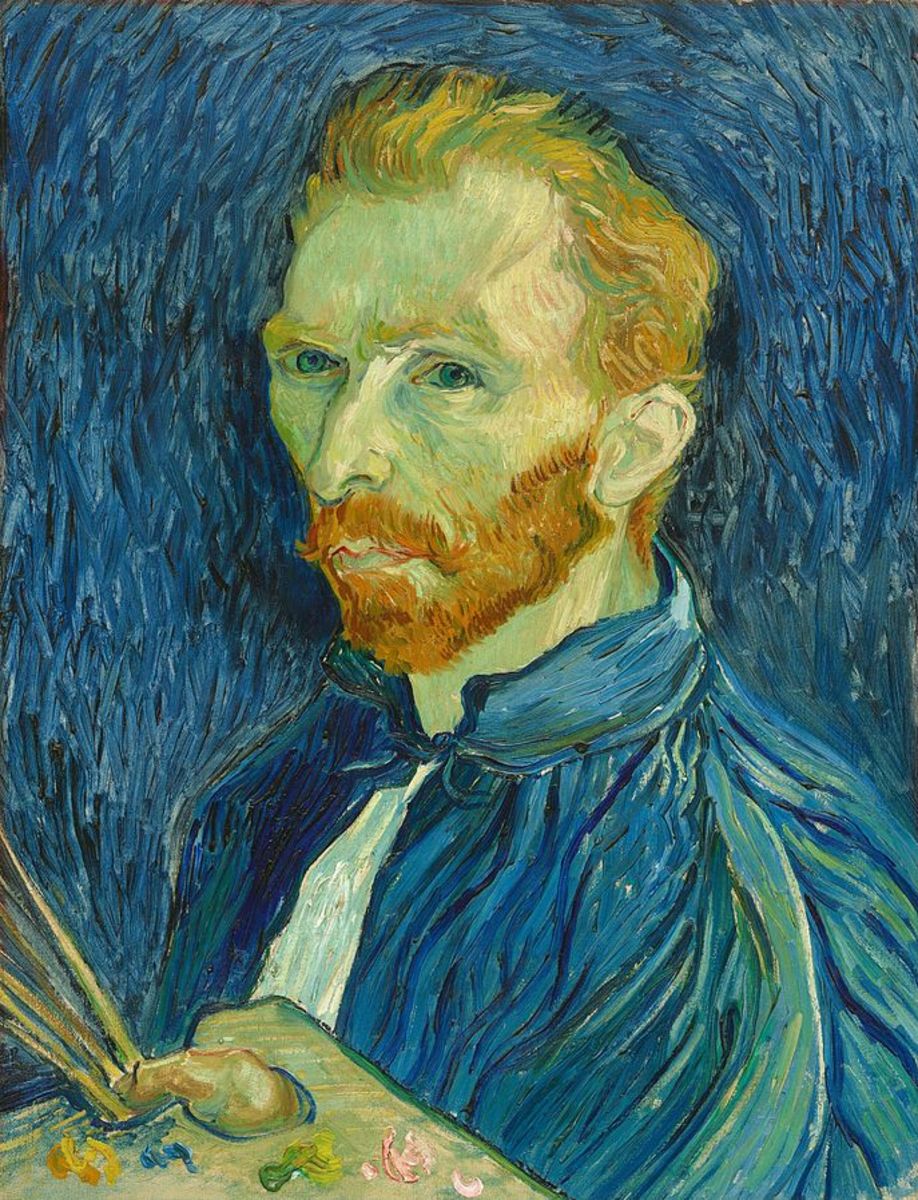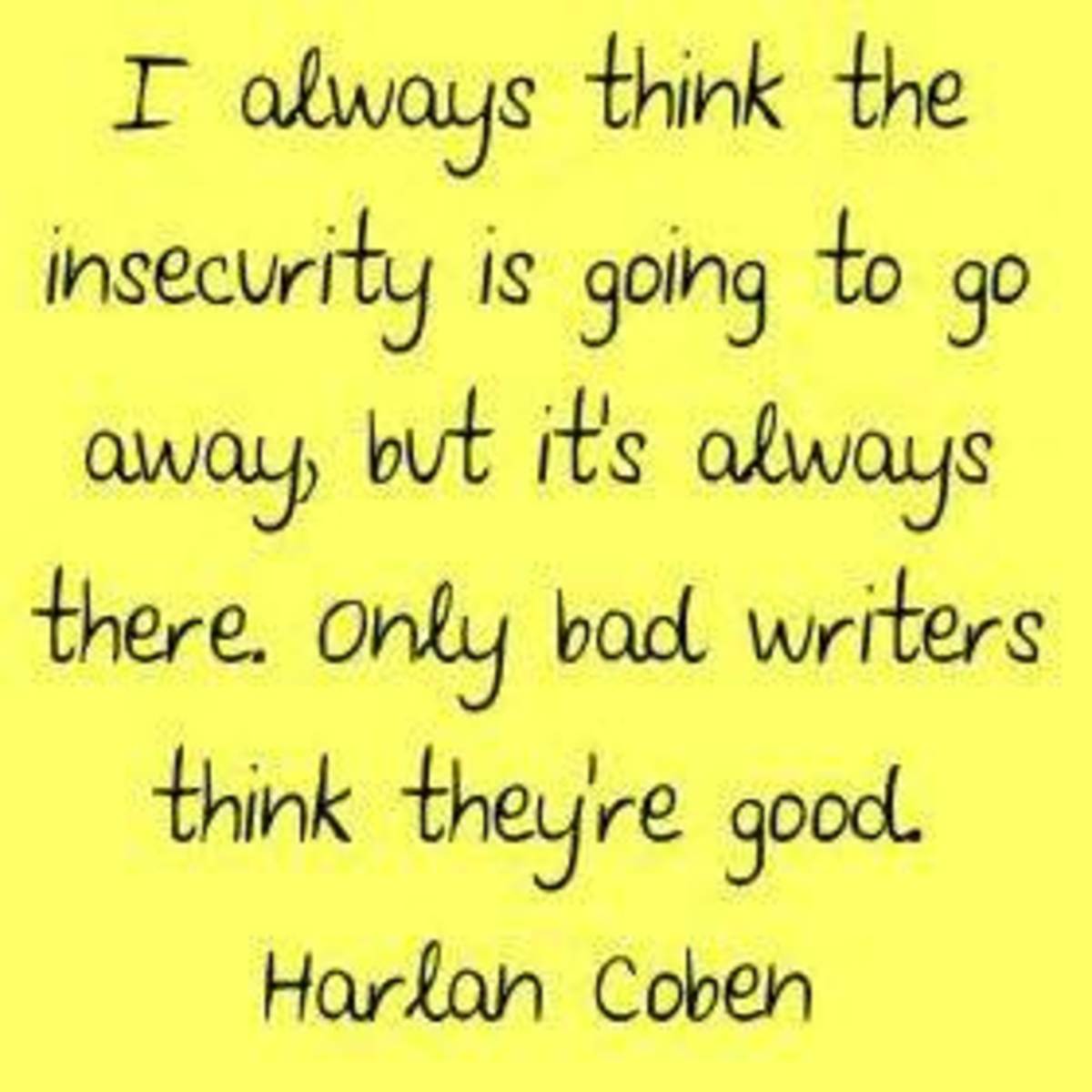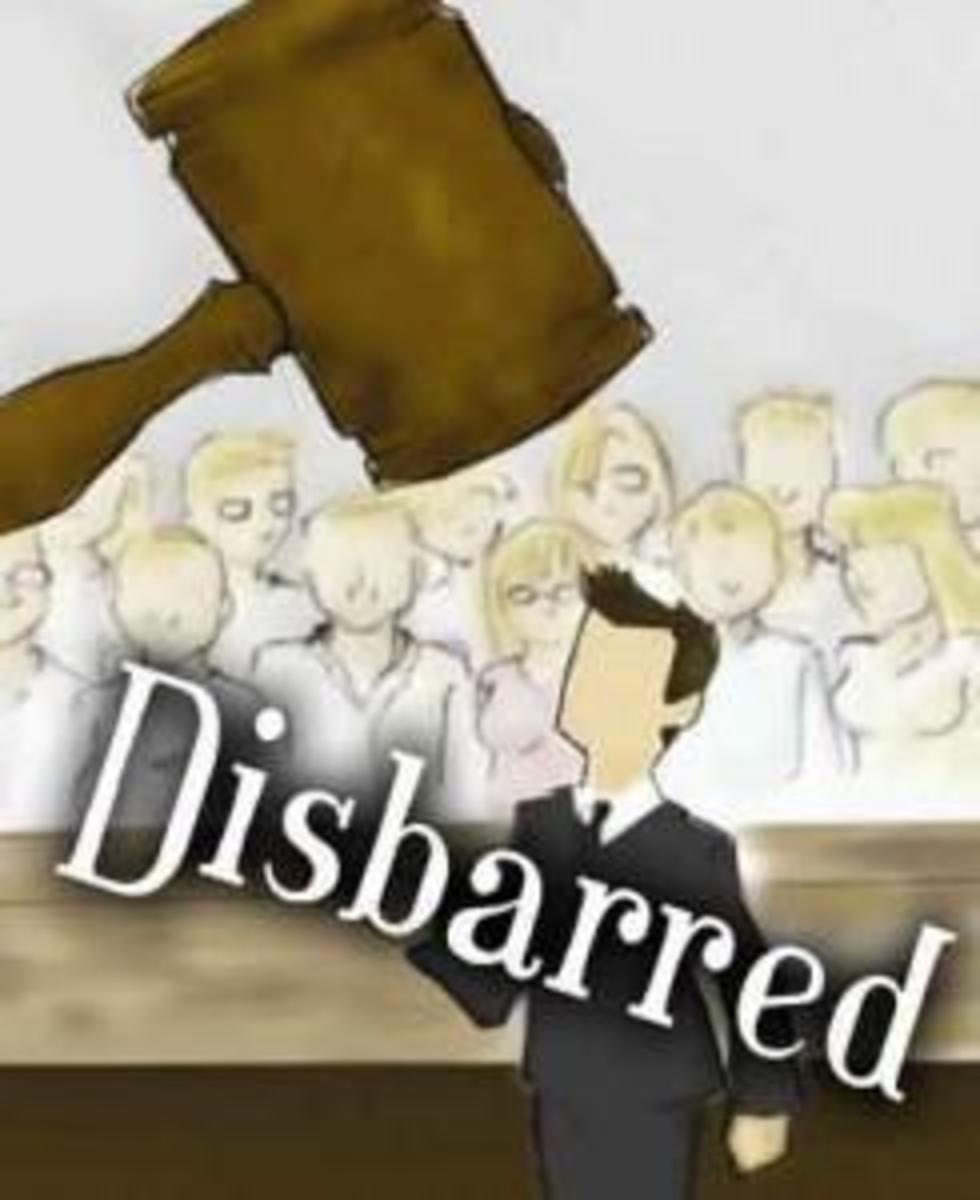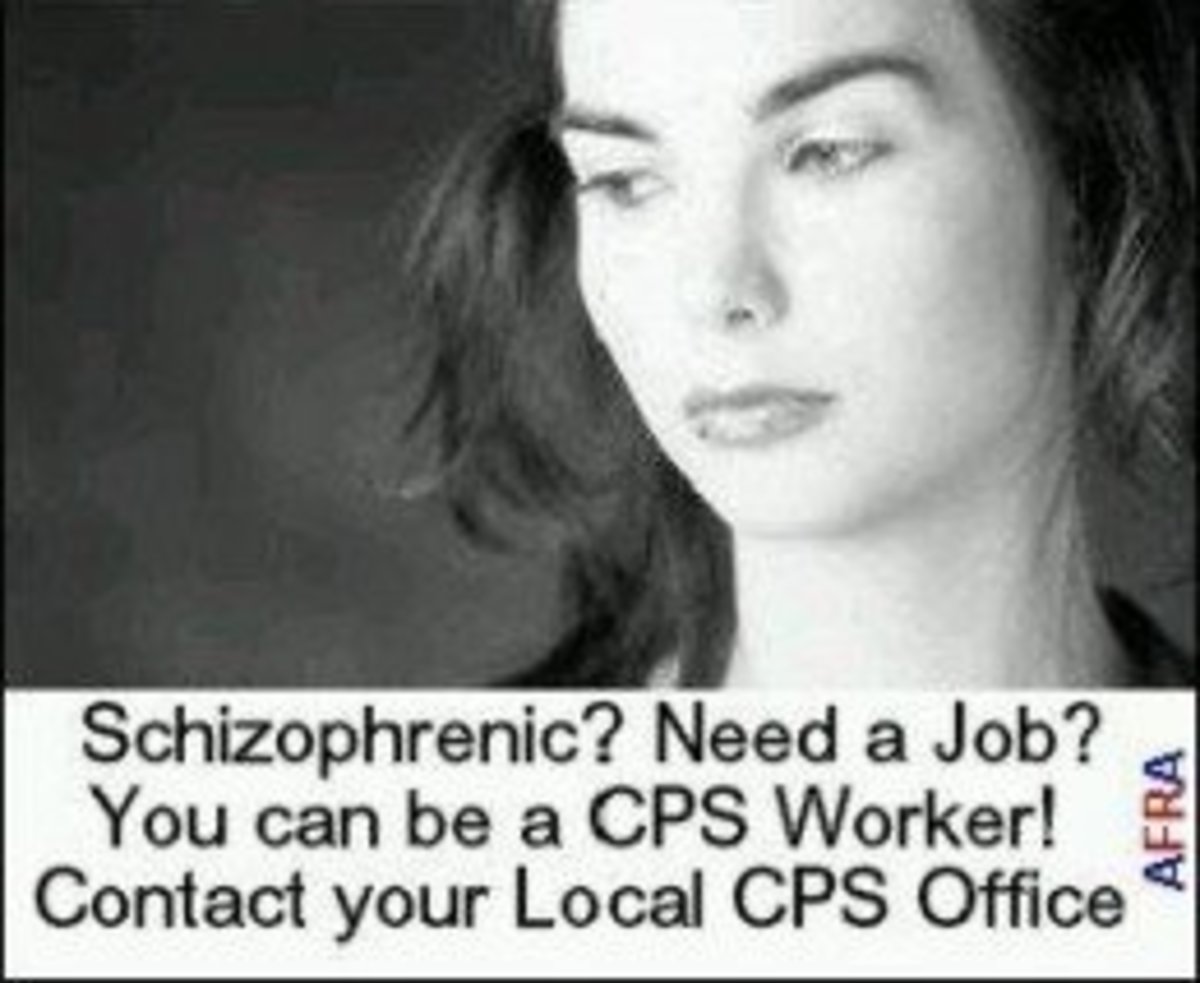Copyrights Q & A | Top 25 Questions From Readers - June 2014
By Rachael O'Halloran
Published July 27, 2014
Copyright Questions
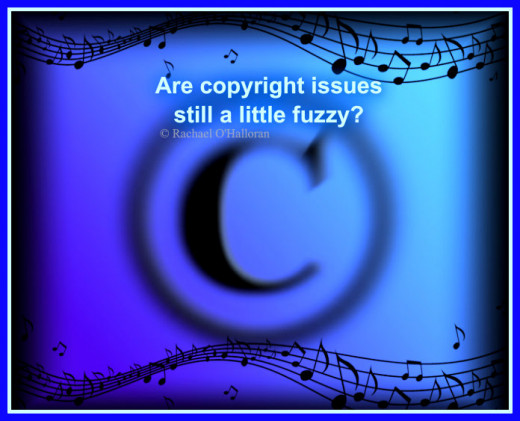
Hey Rachael, what about ....
Since I have been writing articles about copyright laws and infringement cases, I get a fair amount of questions posed to me. Sometimes the questions are asked in the comments and I can answer them there.
Sometimes they are sent by separate email and there isn't always an opportunity or a place to answer them so that everyone can benefit from the question and the answer.
So, why not make a hub about them? Okay, I will.
The following Q & A pertains to US law except as otherwise noted.
Rachael O'Halloran's Trivial Thoughts For The Trivia Minded Reader™
Here are 8 of Ben Franklin's Pseudonyms
Richard Saunders.- Franklin used this name for his very popular "Poor Richard’s Almanac," Letters To The Editor and other commentaries. The newspaper was printed once per year from 1732 to 1758, so he kept it a secret for 26 years!
Silence Dogood. (pronounced Do Good) - Citing 16 year old Ben Franklin's inexperience, his brother James wouldn't allow him to write for his newspaper "The New England Courant." Solution: To get the best of his brother, (mainly to get under his skin) and still be able to do what he loved which was to write for a newspaper, Ben Franklin became a middle aged widow named Silence Dogood, contributing 15 entertaining letters before getting caught. Her letters of wit and satire were a source of great entertainment for readers. She even received several marriage proposals.
Alice Addertongue. Alice is another middle-aged widow Ben created in order to supply gossip for his Franklin's Gazette. This was his newspaper which, today in 2014 we would call a "rag sheet" like the National Enquirer or The Globe. The newspaper printed scandalous stories about prominent and famous citizens in a gossip format and Alice Addertongue was a major contributor.
Celia Shortface and Martha Careful. When Franklin's former employer, Samuel Keimer, stole some of his publishing ideas for his newspaper, Franklin invented these two pseudonyms to get back at him - in writing and in public. The chief functions of Shortface and Careful was to write letters to a rival newspaper, The American Weekly Mercury, to call out Keimer for his misdeeds. It went on for several years!
Anthony Afterwit. Needing writers for his Pennsylvania Gazette and not able to afford to pay them, Ben Franklin created a fine upstanding gentleman, Anthony Afterwit, to write funny and witty letters about married life.
Benevolous. Like all of the other pseudonyms, this one was created out of necessity while Franklin was living in London. He was sick and tired of reading all the negative stuff about Americans in British newspapers. So while he was living there, it was Benevolous's job to write letters to all the British newspapers to set them straight about the ways of Americans.
Busy Body. This was another Ben Franklin moniker who supplied gossip about local business people by writing letters to the American Weekly Mercury. Miss Busy Body was a great source of information.
Polly Baker. Franklin needed and utilized this pseudonym to be able to write about colonial society’s unequal treatment of women. In her letters, Polly pretended to be punished by society for having children out of wedlock and questioned why the fathers of the children went unpunished and unaffected by the unwed mother stigma she had to bear from society.
Ben Franklin's Pen Names
I just love the pen names and how they were perfectly matched up to the job they were meant to do!
Question 1: Pseudonym or Pen Name
I want to register a copyright under my pseudonym, but my friend says I can't do that. Who's right?
An author can register a copyright under a pseudonym (pen name), under their own name, or even under a company or corporation entity name. The copyright office will ask for your real name on the registration form, but you do not have to provide it.
As long as the name which appears on the work is the name you are registering with the copyright, that work is protected.
However, your pen name which is not copyrightable, just the work. Anyone can use the pen name. In fact, it is not unusual to find several writers writing under the same name these days.
If you want to write under a pen name, but you decide you also want to have your legal name on record, fill it in at the appropriate box and then check the "pseudonym" box on the form. This tells the Copyright Office that you are using a pen name for this registered work, and that you don't want your real name on the actual work.
Write out the complete pseudonym name in the next box. Make sure you also have the pseudonym name filled in as "copyright claimant." Complete the form with your citizenship information.
If you don't want your legal name on any records, leave the author box blank.
Remember: Once you give your legal name, it becomes part of the records, but it also goes out onto the internet and it cannot be undone.
Now here's the good and the bad with registering with a pseudonym.
First the bad - It's not the end of the world, but it can present problems if you ever have to go to court or if the author's identity is ever called into question.
With a pseudonym, anyone can take over being YOU if something should happen to you. The work will go on with a new person at the helm, using the same pen name. It's no big deal except to the lawyers!
I am NOT a lawyer, so it is best to consult an intellectual property attorney about this because from here on out, it can be a very sticky wicket. If you conduct business with a fictitious name - translation rights, overseas sales, transfer money from one account to foreign accounts and vice versa - there could be questions about the true ownership of the copyrighted work, especially if your real name appears nowhere on copyright registration forms.
Now for the good - Works using a pseudonym are copyright protected for 95 years from the publication of the work or a total of 120 years from the time of its creation. It's good financially.
Now for one more bad - If the author's TRUE identity is ever revealed on the Copyright Office records, even if it is listed on other registrations, then the 95 years protection is out the window and the term becomes author's life plus 70 years. (which is now 95 years due to 1998 law). The Copyright Office hasn't updated all their screens yet to reflect the 95 year term, so you may read that it still says "life plus 70" on their website.
As long as you keep your pseudonym a secret, your work is protected for 95 years from publication or 120 years from creation.
You have to decide which way will work out best, depending on your age at the time and also the year that the work is actually published for the first time. As long as a work is under copyright, you can make money from it. Once it is in public domain, your income stops.
Question 2: International Law
A fellow writer in my online critique group says his work is covered under "international law" so he's not worried about piracy. What's international law?
There is no such thing as international law when it comes to copyrights. International law pertains to goods being transported from one country to another and having to pass through international airspace or ocean waters.
If your online writer friend lives in a country other than the United States, the laws of that country determine how long his copyright will stand and what parts of the law his copyright will cover.
Piracy is the stealing of authors' work to be resold or retooled in another form. Depending on the country who discovers the piracy act, or where the works were pirated, the laws of that nation will have jurisdiction over the crime.
Copyright law doesn't protect against piracy, no matter what country you live in. Copyrights prove that you own the work, that you have a legal say over where the work appears and how it is used, and gives you grounds for restitution should the work be stolen.
Most nations are members of the Berne Convention (168 countries and counting) and/or the Universal Copyright Convention (120 plus countries and counting). Both Berne and UCC recognize copyrights of all nations so that foreign authors, artists and other creators of works who find their work pirated have legal rights and standing to pursue for damages.
Sharing emails
Aside from funny emails, one has to examine the reason why they would want to republish other types of emails they received.
Is it to teach, comment, or praise?
Is it for monetary gain?
Or is it for the humiliation factor? Would you be uplifted if someone did it to you?
"Sender Beware." If you don't want your words to haunt you on the internet into perpetuity, don't write them in correspondence.
Question 3: If I write a blog about funny emails I've received, am I infringing on anyone's copyright?
E-mail, once created, is copyright protected by the writer. This means you can't post it in a public forum, or forward it, or copy and paste it to put anywhere else without the permission of the sender (author).
Email sent to you doesn't mean you own the copyright on it. You didn't write it; it was sent to you. It is owned by the sender. If the email has a list of recipients in addition to your name, as in a mailing list, each of those names must get permission to reprint, republish, copy and paste or forward it to any other party.
It used to be when internet was just starting out that emails were not copyrighted, unless agreed upon by the parties or unless one slaps the copyright symbol on the email. But with the upgrading of copyright laws, they have managed to cover emails so they are now protected property.
What all email participants also have is an implied right to privacy against republication or broadcast.
If your intended use is a blog post or maybe later as a compilation into an ebook, you would still have to ask permission from each sender.
On the other hand
If you write "about" an email, if you do not use it word for word, and more importantly, if you do not mention any senders by name or other identifying factors, then you are not violating their privacy or copyright, nor do you have to ask permission to use.
If you are compiling blog posts, it might be a good idea to put in each email something to the effect:
"Although you own the copyright on your emails, I may approach you to ask to use any email or parts of any email that you send to me on any of my blogs or in the novel that I've been working on for the last 10 years. If you don't want any part of your email to appear elsewhere, please put "CONFIDENTIAL" in the subject line. Also, please remind me again before you click SEND!"
Music copyright
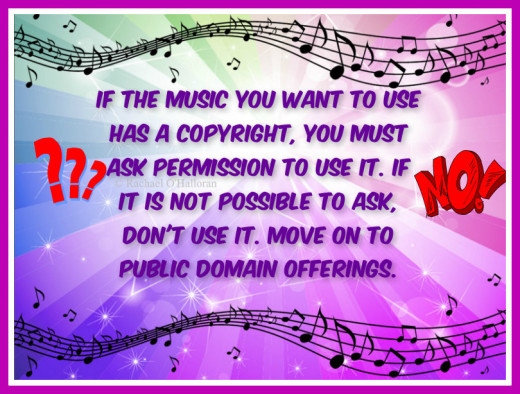
Question 4: I'm a fan of 1980s music. Can I use it as background music of my YouTube video?
Sometimes generational music is in the public domain, depending on when it was created and if the author has released the song into the public domain.
Some music has a Creative Commons license, meaning it is approved only for certain uses, as in non-commercial and personal use. You have to check to see if the particular music you want to use is still under copyright or not.
If it is not, go an extra step further to determine when the copyright had expired so you know you are in the clear to use it. If the copyright did not expire, you must ask for permission to use it. Refer to the album cover for publisher or licensing agent or go to the artist's website.
A mention about music available for free download on a website - it doesn't always mean you can freely use it. People illegally upload music all the time without a care to copyright. Music is pirated more often than photos and text articles. Check to be sure.
By and large, if you can hear it on the radio and it is not older than 70 years, chances are someone owns the copyright to it.
Question 5: How much time do I have before I must file a copyright infringement lawsuit?
Up until 2014, a copyright holder had three years from the time they discovered the copyright infringement to file a lawsuit in federal court.
Now that the Supreme Court has ruled that laches is not a factor (per the Raging Bull movie lawsuit), the three year window has a lot of latitude, so that most cases are admissible for lawsuit without penalty of the three year window.
Easy answer: as soon as possible after you notice the infringement.
Practical answer: Sometimes you don't learn of an infringement for long after the three year limit. They don't want you to drag your heels just because you don't want to file, or because you want to wait for the property worth/value to increase. However, they won't discriminate against you if (in good faith) you take longer than three years to file without detriment.
Question 6: Will the Copyright Office help me in my lawsuit?
The Copyright Office did its part already when you registered the copyright with them. They are nothing more than a keeper of the records, not enforcers of the law.
Seek professional legal advice from a copyright or intellectual property attorney to discuss your legal options.
Question 7: I wrote a children's book for my grandson. Do I have to get it copyrighted?
Just because you wrote it, you already have an automatic copyright - an "implied copyright" so to speak.
If you later decide you want to sell it or maybe donate it to schools or libraries, for example, then you would need a registered copyright.
But, you don't "have to" formally copyright anything. It is in your best interests to do so, to protect you down the line in case of unforeseen circumstances.
You wrote it, your name is on it. For now. Without a registered copyright, anyone can put their name on it and claim it as their own. Your copyright protects you against that.
And who knows? The book might be a hit like Dr. Seuss and you might want to market it next year. But, you'll need a copyright for that.
Always register a copyright for any creative work if it is going to be circulated in any way - even if it is just in the family. It only costs about 40 bucks per work.
Question 8: I still don't quite understand what "fair use" means and how much of a work I'm allowed to use?
I spell this out in my hub at this link, under question 10, but here are the Cliff Notes:
Fair use is when you want to use parts of a work to criticize it, to parody, to use it as a basis for research about the work, use the work to teach, to comment on it (as in a review or commentary), quote some of it in a book or in news reporting (for example).
Acceptable amount of use is between 300 and 400 words but really it depends on the actual length of the work. If it is only 300 words long, then using all 300 words is not fair use - it is copyright infringement because you copied all of it.
If it is 2000 pages and you quote one page, that is fair use because you are using only a small portion of the whole body of work.
Question 9: How do artists get away with making records or books that make fun of other works or artists? Aren't they violating copyright?
No, not really. Lampooning and parody are part of the creative process. It may not be flattering or acceptable to everyone, especially if you are the party being lampooned, but the act is not considered copyright infringement.
It actually is considered fair use.
Two literary works that were reworked as parody are:
- Pride and Prejudice and Pride and Prejudice and Zombies
50 Shades of Grey and
50 Shades of Chicken: A Parody in a Cookbook.
This link has another eight examples.
In music, an artist who comes to mind is Weird Al Yankovic. He has built his career on parody. He claims he always asks permission from the original writers of the songs that he parodies and those who do not grant permission, he does not perform their work. You'll notice on his albums he always gives the songwriter the credit of the original and he takes songwriter credit of the reworked lyrics.
So it is perfectly legal, as long as permission is obtained.
Example of parody in the next video
You'll notice the same music (melody) in the parody version as in the original Michael Jackson version. Just the words have been changed. This was considered "fair use."
If you click on "watch on YouTube" you'll see that this video got over 11 million views.
Michael Jackson's Beat It got 94 million views. The parody did nothing to take away from the original's earnings, traffic, or fame.
Here's Jackson's video to watch after you see the Weird Al video below. Similar scenes, similar choreography (somewhat) but different words and vocals.
Weird Al's Parody of Michael Jackson's Beat It
Don't Copy Other People
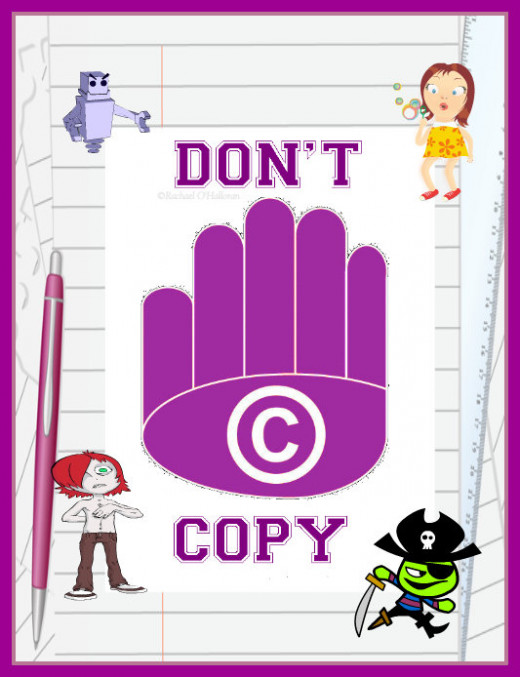
Question 10: Copyright infringement
I thought Google images were free of copyrights. I used a Google image in my article, that I now find out belonged to someone. My whole article got slapped with a takedown notice saying I infringed on the owner's copyright by using that one Google photograph. Can they do that?
Yes, they can. If any part of your article infringes on someone's copyright, they have the right to ask for a removal of the whole article.
Solutions: You can remove the infringing photo altogether; you can either substitute it with a legal use photograph, or you can ask the owner's permission to use the one you have. Once you take care of the photograph problem, you will be able to republish your article.
By the way, Google images are not free, nor does Google actually own them. Google is a search engine with a database chock full of all kinds of stuff, hoping someone will search for it.
If you enter a name, for example, Rachael O'Halloran, you will find pictures of:
- people named Rachael O'Halloran
- people named Rachael
- people named O'Halloran
- pictures that all those people named Rachael O'Halloran has used as a profile picture or in her articles on blogs or websites.
Does Google own them? No.
Does Rachael O'Halloran own them? No.
It means you searched for all things pertaining to Rachael O'Halloran and Google, being the exceptional search engine it is, found them for you.
You have to do your homework to find out who owns the pictures, write to ask permission to use them, wait to get your answer (sometimes up to a week or more) and if you get a yes answer, then you can use them.
Often people who are searching will find a photo used over 100 times in all sizes and frames, leading them to just say "the heck with it" and they use it.
Will anything happen to you if you use a photo that is so widespread?
It is a chance you will have to take to see if they hit you with copyright infringement.
Question 11: I wrote a book when I was 13 years old. The copyright is coming up for renewal. It's so out of print, is it worth renewing?
Since you didn't keep the manuscript in a drawer somewhere all these years, and you did publish this book in some kind of tangible form - either hardback, pamphlet or paperback - the rules are a bit different from your original application for copyright.
Since you said you were 13 at the time of first registration, and it is coming up for first renewal now, this means 28 years have passed and you are now 41 years old.
It is important to note that this work was first copyrighted in 1973, which I gathered from your age information and 28 year first copyright expiration.
With that in mind, a few things have changed with respect to copyright renewals. You can renew the paper copyright if you want, but you don't have to because the Copyright Law of 1976 does it for you.
It used to be that the first renewal term was for 28 years, followed by a second renewal of 28 years for a total of 56 years. After that time, works went into public domain.
But the 1976 law revamped the second renewal, so that it was no longer honored at 28 years. Instead the second renewal was extended for 47 years on any work created and published OR registered by copyright up to January 1, 1978. (Yours was 1973)
This means that all works before 1/1/1978 are copyright protected for a total of 75 years. (47+28=75).
Any work created AFTER January 1, 1978 enjoys auto renewal for life of the author plus 70 years.
Oh, but there's more. Then we have the Sonny Bono Copyright Act of 1998 which extended all copyright terms for life of the author plus another 20 years for a total of 95 years, which is where it stands today -- July 27, 2014.
Your work will be under copyright for the rest of your life plus another 95 years.
Source URL's and "Live" URL's
You don't have to put in a "live" URL on your photos to show your source on HubPages because that "live" URL counts as one of the three you are permitted to use for one site.
Example:
I want to use "legalzoom.com" as one of my URL's. Once I have used it a total of three times, either in my paragraphs or under a photo, HP says I'm done using it and will flag the URL when I try to exit the hub or publish it.
Using it three times means I've worn out my welcome. So now I have to find another URL to use or use none at all. What to do?
Here's the solution:
Leave the URL box empty. In the source box, type in the name of the website. In the photo description box, copy paste the URL (it's not live) so YOU know where you got the photo, to show YOUR readers so they can easily locate it in case they want to use it themselves at a later date and so HUBPAGES knows you obtained it legally.
Result: You haven't used up one of your three uses because it is not a "live" URL and you have legally attributed the photo with a URL.
WHAT'S NO FOLLOW?
Not on your photo capsules, but on your URL links (where you are putting a link in a line of text), get in the habit of clicking to check the box that says NO FOLLOW so you aren't giving backlinks to all those sites.
NO FOLLOW tells the robot that the link is an affiliate link, a paid link, or a link to untrusted content (nofollow).
Backlinks tell Google and other search engines that the site is now soooo popular, useful and in demand, they move them up in search engines status. If you do not want traffic to go to that site, click to check the NO FOLLOW box.
If you are happy and content contributing to their success, go for it.
But they probably won't do the same for you. They probably don't even know who you are.
You can check your backlinks on Google Analytics to see how many people are promoting your website by linking to you.
URL use on your posts
On another issue, the more links you have going OUT of your site, the more links you will have to keep an eye on, in case they go bad - i.e. a site is taken down, the post is removed by owner, the link is broken or the URL has been changed or altered for some reason.
URL's should be used wisely and not packed into your posts. More is not always better.
Question 12: gImages
Rachael, I see so many hubbers writing GIMAGE as a source for their photos. So, what's a gimage and is it legal to put it as a source?
I'm glad you asked! We have lots of hubbers on HubPages using "gImages" or "Gimages" as their sources for photos they use on their HubPages articles. Did they actually find them there, or is it a cop out so they don't have to name a source? Are gImages legal to use?
What exactly are gImages? (g I mages, not g i m a g e s).
GImages is an application you download. It searches per your search term first by scanning through all the search engines (Bing, Google, Yahoo, etc.), but then it goes through all your friends photos looking for the best match to your search term.
Your friends have to have their settings set at "public" and/or name you as an "authorized user" in order for you to access their photos, but that's not always true with Google. If it was ever shared with anyone in the first place, all bets are off and the photos are out in public, no matter what the settings say.
If Google can see it, it spits it out in results. Here's a hint: Share something once, just once, and Google will see it and store it in their humongous cache!
Whether you are entitled to use all these images and photos you find through using the gImages application, and whether they infringe on your friends' copyrights is a very gray area. Therefore, the legalities of using and re-using gImages is nefarious at best.
The TOS for gImages says users are agreeing that others can access their photos and images when their user settings are set to "public," when an "authorized user" is listed, and once a photo has been shared.
What about all those writers who holler "copyright infringement" when someone stole a photo from their website?
Was it really stolen from the website, did they "share" it with someone or did they leave the door open on their main storage area so the gImages application could snag it from them?
That's where it gets a little hairy.
- How many people look to see what their settings are for Picasa or Dropbox?
- Do they really own each of the photos in the first place?
- If they own them, by leaving settings at "public" or "authorized users," did they mean to give permission to you (or the gImages app) to use them?
- By using the photos, are you infringing on the copyright of the real owner?
- If users didn't read the TOS, did they know they gave permission to anyone to use the photos?
It's possible the user thought the public settings were just to allow others to "view" their displayed pictures, not use them.
Several descriptions of gImage applications can be found on this product page and others on that site: Here's the blurb:
- Easily import images from your friends photos on Picasa Web Albums from your iPhone or iPod touch. Upload photos to Dropbox and Picasa Web Albums.
- Features:
- View pictures on sites like Picasa Web Albums
- View favourite users web albums
- Upload photos to web albums
- View photos in landscape mode
- Select image quality
- Swipe to navigate between photos
- Pinch to zoom in and out in photos - Picasa Web Albums is a trademark of Google Inc.
- Shared albums from favourite users are now displayed in gImages, making them available to others when they search.
If you have added anyone as a user or as a "favourite user" and the user shared a "private" album with you (i.e. an album with visibility 'Unlisted' or 'Sign-in required to view'), then this album is now displayed in gImages.
Another product page, same site:
"G-Image provides a fast and easy way to search images/photos. It's an ideal tool to search for photos like wallpapers, celebrity photos, icons, logos, etc.Simply enter your search keyword or phrase, and tap the search button. G-Image will start fetching images and photos from all search engines and displays them in a thumbnail page. Tap a thumbnail to see the high quality original image/photo in a full screen mode, and then tap the action button at the bottom left to copy image, to save image to your photo albums, to go to original web site or to use the image as you wish."
Originally gImages was used for business for logos, icons, etc. Now internet users have integrated gImages to use in other areas like games, web development, and of course for adding photos to HubPages articles! lol
So that is what GImages is.
How do you like it so far?
- From the standpoint of someone who is looking for photos, this is a gold mine.
- From the standpoint of someone who owns photos, this is a potential copyright infringement issue.
Is it legal to use as a source?
No, not really.
When readers click your link, not everyone will be able to see gImages that are only available to you as an "authorized user," however the argument can be made with the gImages application, that once a photo is shared, it is public.
If the source URL doesn't take the reader to a specific place where you actually found the photo, and they can't access it because of the privacy setting,etc, then it is not a legal source. It will return a "404 Not Found" error code or "broken link."
When you put a URL in the source box, you are providing backlink to the source, but you are also telling the reader that you "legally" obtained the photo from that URL and if they click on it, they will see exactly where you got the picture. If the URL doesn't take the reader specifically to that place, then it is not a legal source.
If you put in the URL of the screen where you clicked to open the image in a new tab or window, that is not a legal URL because all the reader will see is the tab where you opened it - not the rest of the webpage or home page.
The link should them to the exact screen where you found the photo, not the screen where there are a gazillion other photos in the same category, so your photo is buried in among hundreds of others.
Your URL is meant to be specific, not a search mission to find it like a game of "Where's Waldo?"
Question 13: Can I take a screenshot of a frame of a YouTube video?
Yes, you can take a screenshot, but what you are going to do with it has a big bearing on whether it will be a permissible use.
If you are using the screenshot to write an article about the video, using it to instruct (as in a game screenshot), to comment on, etc then it can be considered fair use and it is permissible with backlinking to the video.
If you are using the screenshot to use in your own video, as a template, for storyboarding or any use that detracts from the original author's video, income or traffic, then it might be a good idea to find another way to amuse yourself.
Question 14: About fan fiction
If I want to write fan fiction using the setting and characters in one of my favorite books to bounce off of, am I infringing the original author's copyright by using his characters and setting? I just want to continue the story where it left off.
Fan fiction is when you adapt a published story (a work) to fashion it into another story using the same characters and possibly the same setting. Many fan fiction authors write so they can make more stories or so they can continue a story because they don't want to see it come to an end.
The words "fan fiction" are not especially popular with mainstream publishers and intellectual property attorneys - they prefer to use the words "adaptation" or "derivative." In essence, that is what you are doing when you are continuing a story.
Usually fan fiction is published as ebooks or on a dedicated website. But no matter where it appears, if it is in writing (in tangible form), the works are subject to copyright rules - both your work and the original - and you must ask permission to use the characters and/or story line.
The only exception is if they are in the public domain - which of course means that the copyright on the work has expired.
Question 15: YouTube videos
I have downloaded some of my favorite YouTube videos. I wanted to expand on them and add more film to them. So I cut some of film out, added some new film from other videos and did voiceovers with my voice for the commentary. Was what I did legal?
All videos are copyrighted as long as the uploading party had the right to upload the video in the first place. He owns the copyright to the finished product. As for sharing, if his settings show the "share" link or "embed" URL code when viewers are watching the video, it is implied that he is allowing sharing of his work, usually with acknowledgement to him as backlink, or mention in description box. He still has a copyright on it, so you can't put your name on it as a new owner.
If you are using only a small portion of it, or several screenshots, it falls under "fair use" but it would be nice to get permission from the video owner anyway to avoid future complications.
As for adding to or embellishing the video, you would need to ask permission to do so from all the parties of the videos you want to incorporate into the one video.
If the videos are public domain, no permission is necessary.
If there are "creative commons" licenses on any of the videos, the rules for that license apply.
Question 16: I want just the song that played on the video. Can I use it?
Yes, and no. If the song is public domain or free of copyrights, then you can use it. Just because one YouTube account holder used it, doesn't mean he was in the clear to do so legally. Sometimes people break the copyright law and if one does it and others see it done, they will feel it is okay to do it too.
Determine if the song is public domain. If it isn't, ask permission to use it.
To avoid all that, there are a lot of sites who offer copyright free music and you might be surprised at the long list of the choices.
Question 17: Profile Pictures
If I use the picture of a famous person as my profile picture, is that copyright infringement?
It depends on if the photograph is copyrighted.
Did you take the photo yourself - say, at a book signing or a meet and greet? No?
Well then, was there a photographer's name on the photo or listed with the photo when you took it to upload it? Maybe you cropped the name off?
Did the photo come from a tabloid site or magazine?
- Sometimes rag newspapers don't care too much about how their photos are being used and reused because they have embedded their logo into the picture and it is free advertising for them.
- But other entities might get ticked off - like the top four television networks.
Snag it from a rag, and chances are you won't be questioned.
Snag it from the famous star's personal website, and you might get to know them a little better than other fans. (facetiously meant)
Using your child, grandchild, pet or favorite quote might be a better choice and certainly less of an issue of copyright infringement.
Question 18: Pinterest photos
When I am at a total loss for finding a photo for my article, I go to Pinterest. If I link to the place where I found the photo on Pinterest, am I keeping it legal or do I have to question if they own the photo?
Pinterest is a photo sharing website. By the sheer nature of the "repinning" on the site, sharing is implied and condoned. It is understood that each Pinner does not own the photos they pin. Pinterest's recent battles with copyright infringement made national news so that they now have something written into their TOS where:
2a. Pinterest allows you to post content, including photos, comments, links, and other materials. Anything that you post or otherwise make available on our Products is referred to as "User Content." You retain all rights in, and are solely responsible for, the User Content you post to Pinterest.
However, that doesn't mean that every Pinner went to the trouble of finding out if the photo was free of restrictions.
As a rule, on HubPages - the photos you find on Pinterest are acceptable use with a link back to the Pinner.
This is a gray area that may be revisited many times in the future, especially if and when someone of importance decides to take Pinterest to court for infringing on their copyright for photos they themselves sell for profit.
For now, use them and link them.
Question 19: How can I keep my hub from being shared to Pinterest?
You have settings on your HubPages profile that allow you to choose if you want to allow readers to "pin" your hub to their Pinterest boards. You can choose from those settings where you want your work shared (Google Plus, etc.).
Many writers find Pinterest exposure beneficial for their hub traffic.
But on the other hand, hubbers are finding high theft of their work and they blame the exposure on Pinterest and other sharing sites for the problem.
If you don't want your work shared, disable the sharing buttons. It doesn't mean the work won't be shared. It just means you have done your part in helping to deter it on your end.
If you don't want your work stolen, you are playing a fools game because this is the internet - the Wild West of the Web (WWW) - and it is every man for himself in guarding his property.
On website OTHER than HubPages, you can try to input code in webpages to disable copy and paste feature. But if there is a will, there is a way to steal content. Disabling copy and paste will make infringers look for that better way.
Question 20: Isn't it true that if I copy an article that I won't get caught as fast as if I copied a photograph?
No. Either way, you can and will be caught by the author who usually monitors their work after publication.
It's a fools game to think one form of copyright infringement would be less likely to draw attention than the other. If you knowingly copy an article or a photograph, you should know by now that it is against the law and you are stealing from the author.
If you can't create your own content, get a job doing something you can qualify for.
Question 21: Permission
Do I have to get permission for every use of a copyrighted work? Doesn't anyone ever cut some slack?
No, permission is not necessary for every single use.
Sometimes, a copyright has expired and the work is now in the public domain, which means anyone can use the work to facilitate another work, quote from, or build on it. No permission necessary.
Sometimes "fair use" applies to a situation, for example, quoting or using a very small part of an article. Permission should be obtained.
Sometimes, a work is listed under Creative Commons license, which allows permission to use as long as the guidelines of the license are followed. Notification would be nice, but not necessary.
It is always best to err on the side of caution and ask permission when possible. If the author can't be located, the next best person is the publisher. Check copyright notice for licensing agent or publisher name on inside cover of a text work. For all others, check with the distributors of the work for a licensing agent.
Question 22: What is a Creative Commons license? Isn't that the same as free?
No, it is not free - exactly. It doesn't cost money. It is free to use, as per the guidelines in the license.
"Creative Commons" is an organization that licenses certain works (books, articles, images, etc.) and allows the authors to decide where they want their work displayed and the type of attribution.
Creative Commons almost always has some kind of minimal restriction, usually in the form of backlinking and naming the original author.
Creative Commons licenses can be for personal or commercial uses, with or without photographer or author credit and the author still retains ownership of the work. Examples are at the link.
Length of Copyright
How long are copyrights on works created by authors who use pseudonyms?
Question 23: Can I borrow the slogan "Just Do It?" to end my PSA (public service announcements) for a "quit smoking" campaign?
The slogan "Just do it" is a known, registered trademark of the Nike company. They may issue a takedown notice to you, but it is unlikely that they would sue you.
You can ask permission to use it for public service, but since it is a recognizable slogan indigenous to their company, they haven't allowed it as of yet. Anyone "borrowing" it would probably take away from their brand.
Since it is their trademark, the answer is likely a "no."
Question 24: What's the difference between a trademark and a copyright?
Trademarks protect names of products, slogans (tag lines) and symbols. Trademarks are used to identify goods and services in marketplace so the customer can tell the difference between one company from another.
If someone infringes on your trademark, you can sue for trademark infringement in court and prevent any goods from showing your trademark on their product.
Disney's trademark is "The Happiest Place On Earth" which kind of corners the market for any other place on earth, be it happier than Disney or not.
You can read more about trademarks here.
Copyrights protect the work that was created: books, dances, songs, screenplays, paintings, web articles, and photographs.
If you register a copyright, you can protect your work against piracy (stolen content), and control how your work is reproduced, or presented to the public.
If your copyright is infringed upon, you have the right to sue in court for damages. You can learn more about copyrights here.
Question 25: I'm sick of my work getting stolen. Is there a free program I can use to keep better track?
This won't protect your work from being stolen, but it will point out to you who stole it, so you can go after them.
Yes, this is a shameless plug here for COPYSCAPE. The free plan allows you to search 10 URL's per DAY - that is TEN individual URL searches you perform yourself per day. Cost: Free. To me, free is a good plan because as we all know, I like FREE. This is ok if you only have a concern about certain hubs or don't want to pay real money. I use this one. I don't search 10; I search One - my profile page and it spits out all the copied hubs for one search.
~~*~~*~~*~~*~~*~~*~~*~~*~~*~~*~~*~~*~~*~~*~~*~~*
If you want to go PREMIUM, it is five cents per search. You perform the searches yourself, so no DAY or WEEK restriction. Cost: 5 cents per URL.This is probably the best of the four plans because you can check up to 10,000 pages with no limits on how many searches per day. If you limit yourself to 100 URL's, it's $5.00. As long as you don't search 10,000 pages where it costs you $500, it's a good deal.
~~*~~*~~*~~*~~*~~*~~*~~*~~*~~*~~*~~*~~*~~*~~*~~*
These next two are higher plans and they say they can protect your site against plagarism by monitoring for content and emailing you as soon as it happens. To me, that's not protection, that is telling me after the fact, but it is better than nothing. They do the searches for you, whereas the first two above, you do the searches yourself.
To have COPYSCAPE check your pages every WEEK, sign up with standard COPYSENTRY, at $4.95 per month. Your pages are checked only up to 10 pages, then it is 25 cents for each additional page. Not a good bargain if you have over 10 hubs to be checked.
~~*~~*~~*~~*~~*~~*~~*~~*~~*~~*~~*~~*~~*~~*~~*~~*
If you want their Primo plan, sign up for COPYSENTRY Professional at $19.95 per month. Your pages are checked every DAY for up to 10 pages. After 10 pages, it is $1.00 per page. Again, not a good bargain if you have over 10 hubs to be checked.
Whew, made it to the end!
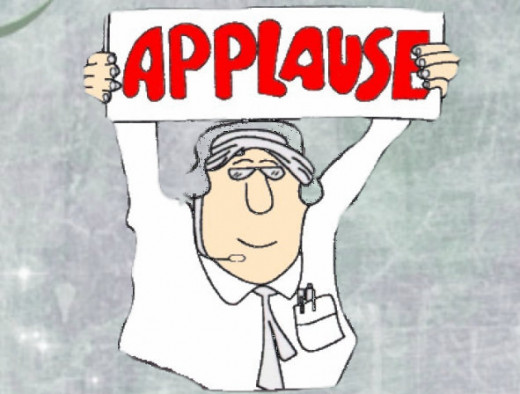
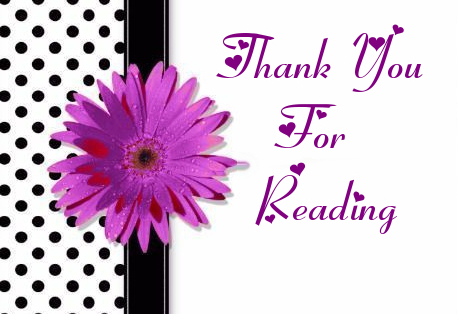
Do Not Copy

© Rachael O'Halloran, July 27, 2014
© 2014 Rachael O'Halloran

